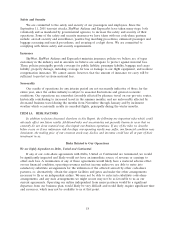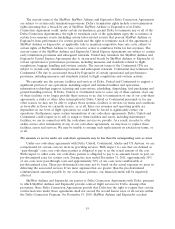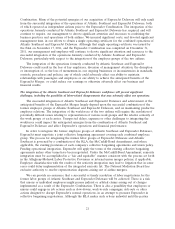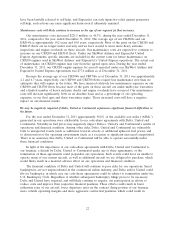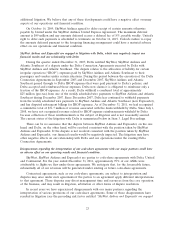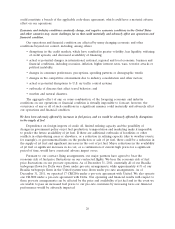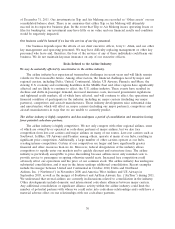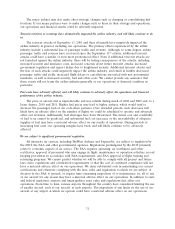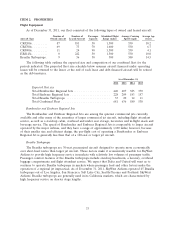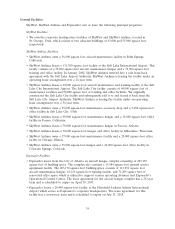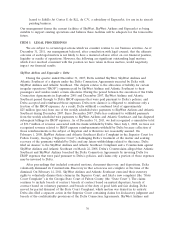SkyWest Airlines 2011 Annual Report Download - page 31
Download and view the complete annual report
Please find page 31 of the 2011 SkyWest Airlines annual report below. You can navigate through the pages in the report by either clicking on the pages listed below, or by using the keyword search tool below to find specific information within the annual report.The Airline Safety and Pilot Training Improvement Act of 2009 could negatively affect our operations and our
financial condition.
Prompted by the crash of a Colgan aircraft, which killed 50 people near Buffalo, New York,
passengers and governmental authorities have raised questions about pilot qualifications, training and
fatigue. The Airline Safety and Pilot Training Improvement Act of 2009 (the ‘‘Improvement Act’’) was
enacted in August of 2010. The Improvement Act adds new certification requirements for entry-level
commercial pilots, requires additional emergency training, improves availability of pilot records and
mandates stricter rules to minimize pilot fatigue.
The Improvement Act also:
• Requires that all airline pilots obtain an Airline Transport Pilot license, which was previously
only required for captains.
• Mandates that the FAA set up a new database of pilot records, including records to be provided
by airlines and other sources, so that airlines will have access to more information before they
hire pilots.
• Requires the FAA to issue new regulations governing the airlines’ obligations to submit pilot
records and the requirements for airlines to obtain access for information in the database before
the database portion of the Improvement Act becomes effective.
• Directs the FAA to rewrite the rules for how long pilots are allowed to work and how much rest
they must have before working.
The implementation of the Improvement Act (and associated regulations) may increase our
compliance and FAA reporting obligations, have a negative effect on pilot scheduling, work hours or
other aspects of our operations, and negatively impact our operations and financial condition.
Reduced utilization levels of our aircraft under our code-share agreements would adversely impact our
financial results.
Our code-share agreements set forth minimum levels of flight operations which our major partners
are required to schedule for our operations and we are required to provide. These minimum flight
operating levels are intended to compensate us for reduced operating efficiencies caused by production
decreases made by our major partners under our respective code-share agreements. Generally, our
major partners have utilized our flight operations at levels which exceed the minimum levels set forth
in our code-share agreements, however, in recent years our major partners have reduced our utilization
to levels which, at times, have been lower than the levels required by our code-share agreements. If our
major partners schedule the utilization of our aircraft below historical levels (including taking into
account the stage length and frequency of our scheduled flights), we may not be able to maintain
operating efficiencies previously obtained, which would negatively impact our operating results and
financial condition. Additionally, our major partners may change routes and frequencies of flights,
which can shorten flight trip lengths. Changes in schedules may increase our flight costs, which could
exceed the reimbursed rates paid by our major partners. Continued reduced utilization levels of our
aircraft or other changes to our schedules under our code-share agreements would adversely impact our
financial results.
There are long-term risks related to supply and demand of regional aircraft associated with our regional
airline services strategy.
Many of our major airline partners have publicly indicated in the past that their committed supply
of regional airline capacity is larger than they desire given current market conditions. Specifically, they
cite an oversupply of 50-seat regional jets under contractual commitments with regional airlines. Delta
27



